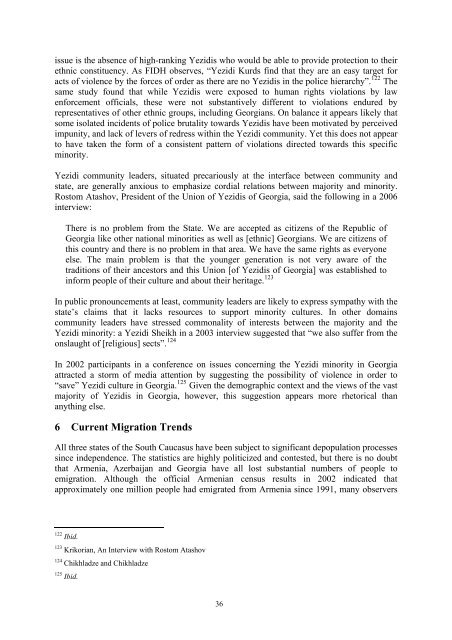The Human Rights situation of the Yezidi minority - UNHCR
The Human Rights situation of the Yezidi minority - UNHCR
The Human Rights situation of the Yezidi minority - UNHCR
Create successful ePaper yourself
Turn your PDF publications into a flip-book with our unique Google optimized e-Paper software.
issue is <strong>the</strong> absence <strong>of</strong> high-ranking <strong>Yezidi</strong>s who would be able to provide protection to <strong>the</strong>ir<br />
ethnic constituency. As FIDH observes, “<strong>Yezidi</strong> Kurds find that <strong>the</strong>y are an easy target for<br />
acts <strong>of</strong> violence by <strong>the</strong> forces <strong>of</strong> order as <strong>the</strong>re are no <strong>Yezidi</strong>s in <strong>the</strong> police hierarchy”. 122 <strong>The</strong><br />
same study found that while <strong>Yezidi</strong>s were exposed to human rights violations by law<br />
enforcement <strong>of</strong>ficials, <strong>the</strong>se were not substantively different to violations endured by<br />
representatives <strong>of</strong> o<strong>the</strong>r ethnic groups, including Georgians. On balance it appears likely that<br />
some isolated incidents <strong>of</strong> police brutality towards <strong>Yezidi</strong>s have been motivated by perceived<br />
impunity, and lack <strong>of</strong> levers <strong>of</strong> redress within <strong>the</strong> <strong>Yezidi</strong> community. Yet this does not appear<br />
to have taken <strong>the</strong> form <strong>of</strong> a consistent pattern <strong>of</strong> violations directed towards this specific<br />
<strong>minority</strong>.<br />
<strong>Yezidi</strong> community leaders, situated precariously at <strong>the</strong> interface between community and<br />
state, are generally anxious to emphasize cordial relations between majority and <strong>minority</strong>.<br />
Rostom Atashov, President <strong>of</strong> <strong>the</strong> Union <strong>of</strong> <strong>Yezidi</strong>s <strong>of</strong> Georgia, said <strong>the</strong> following in a 2006<br />
interview:<br />
<strong>The</strong>re is no problem from <strong>the</strong> State. We are accepted as citizens <strong>of</strong> <strong>the</strong> Republic <strong>of</strong><br />
Georgia like o<strong>the</strong>r national minorities as well as [ethnic] Georgians. We are citizens <strong>of</strong><br />
this country and <strong>the</strong>re is no problem in that area. We have <strong>the</strong> same rights as everyone<br />
else. <strong>The</strong> main problem is that <strong>the</strong> younger generation is not very aware <strong>of</strong> <strong>the</strong><br />
traditions <strong>of</strong> <strong>the</strong>ir ancestors and this Union [<strong>of</strong> <strong>Yezidi</strong>s <strong>of</strong> Georgia] was established to<br />
inform people <strong>of</strong> <strong>the</strong>ir culture and about <strong>the</strong>ir heritage. 123<br />
In public pronouncements at least, community leaders are likely to express sympathy with <strong>the</strong><br />
state’s claims that it lacks resources to support <strong>minority</strong> cultures. In o<strong>the</strong>r domains<br />
community leaders have stressed commonality <strong>of</strong> interests between <strong>the</strong> majority and <strong>the</strong><br />
<strong>Yezidi</strong> <strong>minority</strong>: a <strong>Yezidi</strong> Sheikh in a 2003 interview suggested that “we also suffer from <strong>the</strong><br />
onslaught <strong>of</strong> [religious] sects”. 124<br />
In 2002 participants in a conference on issues concerning <strong>the</strong> <strong>Yezidi</strong> <strong>minority</strong> in Georgia<br />
attracted a storm <strong>of</strong> media attention by suggesting <strong>the</strong> possibility <strong>of</strong> violence in order to<br />
“save” <strong>Yezidi</strong> culture in Georgia. 125 Given <strong>the</strong> demographic context and <strong>the</strong> views <strong>of</strong> <strong>the</strong> vast<br />
majority <strong>of</strong> <strong>Yezidi</strong>s in Georgia, however, this suggestion appears more rhetorical than<br />
anything else.<br />
6 Current Migration Trends<br />
All three states <strong>of</strong> <strong>the</strong> South Caucasus have been subject to significant depopulation processes<br />
since independence. <strong>The</strong> statistics are highly politicized and contested, but <strong>the</strong>re is no doubt<br />
that Armenia, Azerbaijan and Georgia have all lost substantial numbers <strong>of</strong> people to<br />
emigration. Although <strong>the</strong> <strong>of</strong>ficial Armenian census results in 2002 indicated that<br />
approximately one million people had emigrated from Armenia since 1991, many observers<br />
122 Ibid.<br />
123 Krikorian, An Interview with Rostom Atashov<br />
124 Chikhladze and Chikhladze<br />
125 Ibid.<br />
36
















